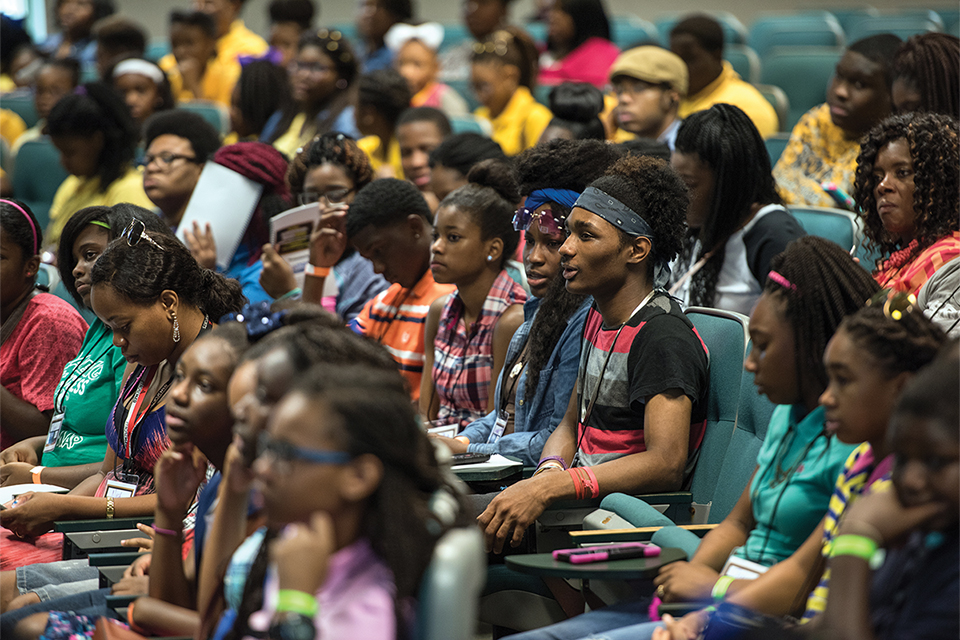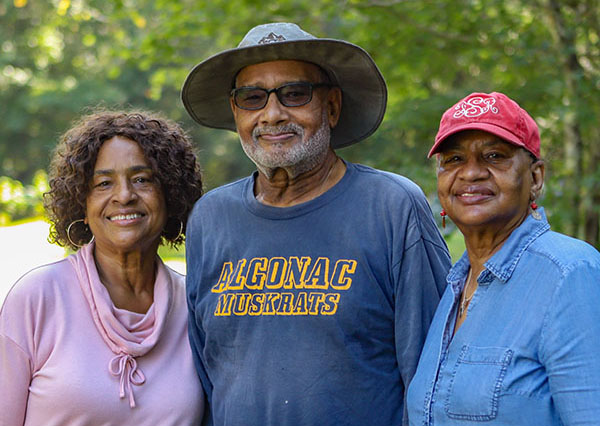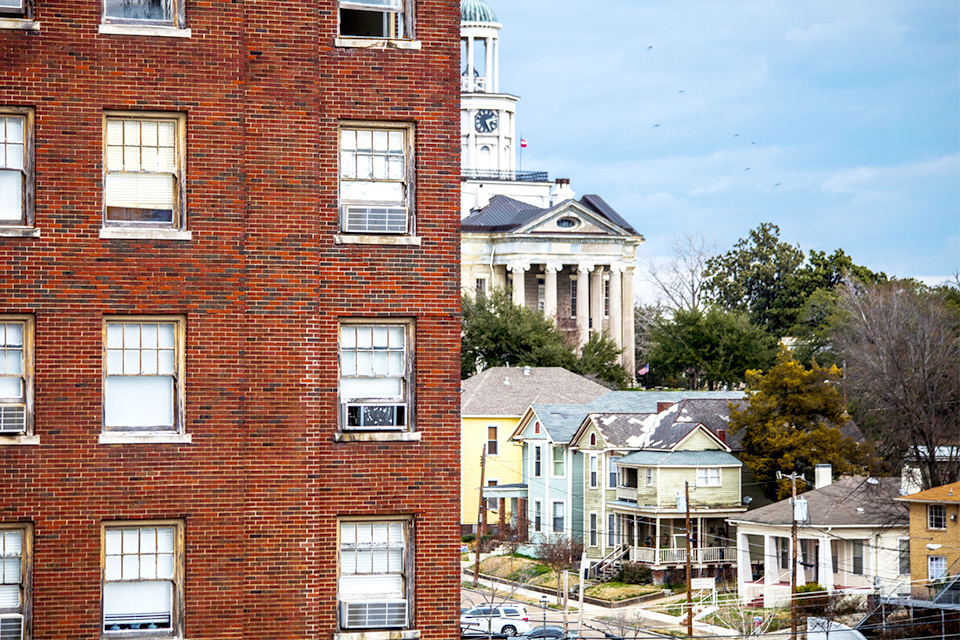At the heart of the Center’s mission to create a just society is a desire to build healthy communities across Mississippi.
By engaging elected officials, faith-based leaders, media, community activists, educators, childcare providers, healthcare professionals and other advocacy partners, the Mississippi Center for Justice provides the legal perspective to policy initiatives that improve the lives of Mississippians.
With offices in Jackson, Biloxi and Indianola, the Center seeks systemic solutions that promote educational opportunity, protect the rights of consumers, secure access to healthcare, ensure equity in disaster recovery and put affordable housing within the reach of all Mississippians. Please visit the individual areas of work to learn more.
Mississippi’s legacy of poverty is prevalent throughout the state, particularly in communities of color. Predatory lenders – including payday lenders, check cashers, title loans companies, and others – find an environment ripe for preying on the working families and the elderly who find it financially difficult to pay for basic necessities. The impact of predatory lending is compounded by a policy environment that offers few consumer protections. Repeatedly, the fabric of low-income communities of color are torn apart because, while they own fewer homes in Mississippi, theirs are twice as likely to be foreclosed due to disparities of income and the lack of an inclusive financial infrastructure that allows for fair and competitive loan products.
Educational attainment does help change this landscape. Mississippians with college degrees are less likely to experience financial hardship than Mississippians who only have a high school diploma. However, there has also been a spike in problematic student loan debt stemming from expensive for profit colleges in Mississippi. In Mississippi, the fees associated with being poor adversely affect single mothers and communities of color, keeping them entrenched in a cycle of debt that has a negative effect on their children’s education, health and overall wellbeing. The need for reform has never been greater.
If you are in the market for a loan product and would like to make an informed decision, you can visit the Consumer Financial Protection Bureau website.
Economic Justice
Initiatives and Resources
Disaster Recovery
Disasters, both natural and manmade, affect the physical health of a community, interrupt the education of its children and wipe away the precious, yet limited, resources some have worked so hard to attain. They often reveal systemic, engrained disparities that renew the debate about issues affecting truly equitable recovery efforts.
In the wake of disasters, emergency needs such as food and clothing are often quickly addressed. But what about the legal needs to help ensure that low- and moderate-income families have equal access to recovery resources intended to sustain neighborhoods and rebuild communities?
In the aftermath of Hurricane Katrina, Mississippi Center for Justice leveraged the unprecedented influx of pro bono legal assistance to help open doors for low and moderate income families.
The Center also learned lessons from that recovery effort and applied them as it established a regional legal response to BP’s Deepwater Horizon Oil Rig explosion. From providing direct legal services to influencing the policy decisions that create the framework for future disaster recovery regulations, the Center and its allies are committed to protecting access to justice for everyone impacted by disasters in the region.
Education
The economic future of a state rests on the quality of the education of its citizens. Sadly, lack of access to a quality education is far too common for Mississippi’s children. Every year, Mississippi ranks at or near the bottom for student achievement. These statistics become even more daunting within communities of color and for students with disabilities. These students are more likely to face the prospect of schooling without basic instructional resources like experienced teachers, up to date textbooks/instructional resources, or access to a wide variety of rigorous academic courses or extra-curricular activities that make school engaging and develop soft skills students need for the world of work and democracy in the 21st century.
During the 2020-21 school year, the academic achievement gap, as measured by proficiency rates of various student groups on the Mississippi Academic Assessment Program (MAAP) tests, spells out how stark educational disparities are in Mississippi. The achievement gap between Black and white students was 34.4% in Math and 29.6% In English Language Arts. The percentages indicate the difference in proficiency rates for the Black and white students on the MAAP tests. The gap between students without disabilities and students with disabilities was 26.6%. English language learners had a 20% gap between them and students who spoke English as a native language. These disparities are the products of an unjust and inequitable distribution of resources and thus educational opportunities for these groups of students, their families, and communities are severely limited. According to data from the MDE reporting data explorer website and the MDE Accountability Website, during the same school year, the average demographic make-up of school districts rated “A” by the state was 63.5% white and 25.2% Black. Districts rated “F” by the state were 7.2% white and 94.0% Black, on average. MCJ is committed to supporting a fair and equitable educational system that meets the needs of all students in Mississippi.
Education

Current Initiatives
Past Initiatives
Access to affordable, quality healthcare is critical to a state’s overall health, education and economic status. Better health outcomes are directly related to insurance coverage that prevents developmental problems in children, increases workforce productivity, reduces use of emergency room services and decreases the cost of publicly-funded programs.
Currently, approximately 500,000 Mississippians are without health insurance coverage, and approximately 100,000 of them are children. Poor health in childhood leads to poor health later in life. Mississippi restaurant, retail, and construction workers are among the thousands of uninsured residents who would be eligible for health insurance if the state expanded Medicaid. Here is a full profile of Mississippi’s uninsured low-wage workers.
In coalition with other advocates, Mississippi Center for Justice is working to remove barriers that prevent Mississippians and their children from getting the vital care they need to lead healthy and productive lives. The Center is working to ensure that Mississippi fully implement the Affordable Care Act and fight against the discriminatory practices that make it harder for people living with HIV/AIDS to obtain affordable housing, maintain employment and protect their right to privacy. The Center is also working to bridge the gap in access to healthcare for communities of color who suffer from high rates of death from treatable diseases like diabetes. Tell us your experience applying for Medicaid/CHIP and any barriers to accessing health coverage.
Access to Healthcare
Initiatives
Heirs’ Property
Heirs’ Property Hotline – 877-952-4347
The Mississippi Center for Justice protects heirs’ property and promotes its sustainable use to provide increased economic benefit to historically underserved landowners. Through education and direct legal services, we hope to serve, support, and empower heirs’ property owners and their communities throughout Mississippi. Ultimately, we want to offer services that will help heirs’ property owners keep, protect and utilize their land for generations to come, while protecting it from the pitfalls of predatory developers and timber harvesters, tax sales and forced partition sales. Learn more at mscenterforjustice.org/heirs.
Housing
Fair Housing Hotline – 877-352-2269
COVID-related Eviction Hotline – 228-702-9983
The need for safe, decent, affordable housing across the state of Mississippi is great. Lack of housing options drive gaps in education, health and economic opportunities, particularly for low-income and African-American Mississippians. In fact, the state’s average home value is 50 percent lower than the national average, making it second lowest in the country.
In African American communities, the statistics are even more grim – many more African Americans rent, rather than own. Additionally, almost 32 percent of African American-occupied rental units spend more than half of their income on rent, and on facilities that are older and often overcrowded.
The Center knows that one of the best ways to strengthen communities is by investing in quality housing that is affordable to people at all income levels. The Center is working to address housing gaps in the areas of affordable housing, fair housing and public housing, as well as promoting housing policy as part of its sustainable community initiatives.
Mississippi Center for Justice operates Mississippi’s only statewide COVID-related eviction hotline, which has served more than 470 Mississippians to date.
For consumers who are facing eviction or other household disruptions due to COVID-19, MCJ has helped produce six videos that can serve as a valuable resource.
The George Riley Impact Litigation Initiative
The George Riley Impact Litigation Initiative is a ten-year initiative to provide litigation and public policy advocacy in areas related to racial and economic justice, including voting rights, housing, consumer protection, and educational access. In 2017, MCJ and Rob McDuff jointly launched the George Riley Impact Litigation Initiative, which is named in honor of longtime MCJ board member the late George Riley.
Cases Under the George Riley Impact Litigation Initiative include:
State v. Curtis Flowers. After the conviction and death sentence from Curtis Flowers’ sixth trial was reversed by the U.S. Supreme Court, our Impact Litigation Director, Rob McDuff, was asked to lead his defense for a potential seventh trial. Our bail motion was granted in December 2019 leading to his release after 23 years in prison. Subsequently, we persuaded the Attorney General of Mississippi to dismiss all charges, bringing this tragic prosecution of an innocent man to an end on September 4.
Oppenheim v. Watson. On behalf of six Mississippi voters, we sued in state court for a declaratory judgment to interpret state law to allow for expanded absentee voting during the COVID-19 pandemic. We won a partial victory for our clients who had pre-existing conditions that make them more susceptible to severe consequences from COVID-19 but lost with respect to our contention that all people following public health guidance to avoid community events should be able to vote absentee.
Thomas v. Bryant. Our challenge to the discriminatory lines for a state senate district in the Mississippi Delta led to the election in 2019 of the first Black senator ever chosen from that district.
McLemore v. Hosemann. In our case challenging a provision of Mississippi’s racist 1890 Constitution that allowed Mississippi’s legislature to choose the winner of statewide elections under certain circumstances, the current legislature responded to the lawsuit by placing an amendment on the November ballot that would repeal the 1890 provision.
Harness v. Hosemann. We have also brought suit against the felon disfranchisement provision of that same racist 1890 Constitution because it targeted what the framers considered to be Black crimes.
Post 2020-Census Redistricting: We are organizing a campaign to protect black voting rights and prevent dilution of Black voting strength during the redrawing of election lines that will occur at the state, county, and city levels after the release of the 2020 census data.
Waddell v. Cain. In our case challenging the woefully inadequate COVID-19 prevention and mitigation measures at Mississippi’s two largest prisons, we negotiated an agreement with prison officials for extensive improvements.
Dockery v. Cain. We are assisting with the appeal of an adverse decision regarding the terrible conditions of confinement of another Mississippi prison.
Marshall Project v. MDOC & MTC. We represented the Marshall Project, a renowned investigative news organization focusing on criminal justice issues, in litigation over its effort to obtain records regarding operations of Mississippi’s private prison contractor. The court ordered the records to be disclosed.
Protest Support. We provided legal observers in support of Black Lives Matter protesters in Mississippi in the months after the George Floyd killing.
City of Petal v. Harris; City of Petal v. Ciobanu. We are defending some protesters against misdemeanor charges in the town of Petal, Mississippi relating to their public campaign against Petal’s Mayor who claimed that George Floyd obviously could breathe since he was able to say he couldn’t breathe and also claimed that George Floyd likely died or an overdose or a heart attack.
Martinez v. Hancock County. Our lawsuit against a Mississippi county notorious for stopping Hispanic drivers on a pretense of drug searches led to a significant settlement for our clients — a family of three generations stopped and held at the sheriff’s office for hours while their car was thoroughly searched — and to adoption of new policies and significant structural changes in the sheriff’s department.
Jackson Women’s Health Organization v. Dobbs. We assist in the representation of Mississippi’s only abortion clinic and have obtained injunctions in three separate cases against draconian restrictions passed by Mississippi’s legislature in an effort to limit the rights of Mississippi women to make their own decisions in matters of childbirth.
MIRA v. Watson. We are challenging a 1927 Mississippi law requiring naturalized citizens, but no others, to present proof of citizenship in addition to the usual requirements to register to vote, and also Mississippi’s “matching” program that compares voter registration applications with the drivers license database and often leads to voter registration denials of Hispanic people based on inaccurate assumptions that they are not citizens.
Mississippi v. Navient Corporation, Sallie Mae Bank and Navient Solutions LLC. Suit where we have joined the Mississippi Attorney General in challenging actions of student loan lender and servicer.
Hadley v. Garner and Thrasher v. Rogers. We filed suit and obtained temporary restraining orders preventing landlords from cutting off utilities to two tenants in an effort to evict them in violation of the Governor’s order in the early stages of the pandemic placing a moratorium on evictions.
Barber v. Bryant. We challenged Mississippi’s anti-LGBT “religious freedom” law passed in 2016 and known as “House Bill 1523.” We won an injunction against the law from the federal district court that remained in place for a year until it was overturned by the Fifth Circuit Court of Appeals. The United States Supreme Court denied our petition for review.
Zawadski v. Brewer Funeral Home. We settled our case against a Mississippi funeral home that refused to honor a contract for funeral services upon discovering that the male decedent’s spouse was also male.
Big House Books v. Hall. Our suit challenging the practice of the South Mississippi Correctional Institution of prohibiting delivery of free non-religious books to inmates while allowing it for religious books was resolved when the prison abandoned this unconstitutional practice.
Human Rights Defense Center v. Forrest County. Our suit against Forrest County , Mississippi and its Sheriff for restricting reading materials in the jail and refusing to allow prisoners to receive the HRDC’s publications, including the well-respected periodical Prison Legal News, was resolved by consent decree when the Sheriff agreed to a new policy that conforms to the First Amendment.





